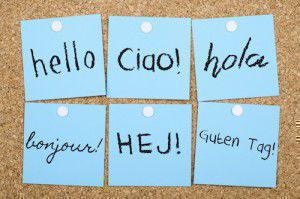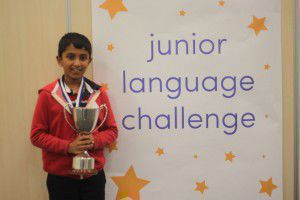A Language Journey
Today we’ve got a fantastic guest post from Kelly Wang – English teacher, accidental traveller, cake whisperer, dinosaur believer – on her personal language learning journey.
If you’ve got a language story to tell, we’d love to hear it! Now over to you, Kelly…
My journey through languages began in sequins and shoulder pads.
At the age of seven I remember clutching a Pot Noodle (Chow Mein flavour, if you must know), with an A4 pad in front of me and one of those 10 coloured pens ready and poised, waiting for the Eurovision Song Contest.
It has long been a tradition in my family to watch the Eurovision together, and to give marks out of ten to the acts. And at that age, I was of the opinion that English was the only language in the world, so my marking scheme would include whether or not the songs were in English. No English? Nil points.
I even took exception to the fact that each country when giving their own points spoke in their own language. How rude.
Fast forward to the last year of primary school and we learnt a few French words like bonjour and le livre and la fenêtre.
I still thought English was the best language.
But then, on reaching secondary school, when we started to learn a ‘modern foreign language’ regularly (in my case, French), I loved it. I loved the idea of being able to speak to everyone, no matter the language. And better than that, I was picking it up pretty easily.
The following year there was a repeat performance with learning German, and I remember a sort of teenage arrogance of thinking that languages were going to be ‘my thing’, because by the time I was sixteen I could also say Θέλω να πάω σπίτι in Greek – Thélo̱ na páo̱ spíti (I want to go home).
Over the years I’ve flirted with a lot of languages. I tried Chinese for a while, but with the complicated tonation, I was more worried about causing offence with the way I said a word, and less worried about actually stringing a sentence together.
And then, I found my true language love. The one language I could lose myself in and spend hours learning just for fun. The one language I would squeal over if I heard it spoken in public. Which is Finnish. Naturally.
Finnish may sound like an odd choice, but it made perfect sense to me. What started with a passing interest listening to Finnish metal music erupted into a bit of an obsession when I found myself frustrated that I couldn’t understand the Finnish ice hockey commentary.
For almost two years, Finnish became my number one hobby. Being relatively self-disciplined when it comes to studies, I decided to learn through a mix of self study and online language exchanges. Many an adventure was had along the way, and that perhaps is a story for another time, but I loved it. No prepositions to learn because everything was a suffix, and by changing the word ending you could say a whole range of things about it: saunassa, saunasta, saunan (in the sauna, from the sauna, for the sauna). No articles, no need to wonder if your table was a girl and your chair was a boy, it didn’t matter. Neither did you have to refer to a person as he or she, one simple han and it was covered! Beautiful.
Fast forward another year, and I found myself attempting to get to grips with Hungarian. Now for those of you who don’t know, Finnish and Hungarian are cousins of the language world, and it depends on which scholar you speak to as to how close a family they are. My experience was that whilst it sounded an awful lot like Finnish, Hungarian was nothing like it at all, except for the odd words like toilet: Hungarian – vécé, Finnish vessa.
And currently, I find myself in Spain. Adamantly not learning the language.
Because the problem now, with being a ‘jack of all trades, master of none’ when it comes to language, is that they all get tangled up. A waiter asks me if I want a refill, I answer in a mix of Spanish and Hungarian. I overhear staff in my local Chinese supermarket and confuse them – and myself – by responding in Chinese rather than Spanish. And recently on a stopover in Paris, I managed to respond to questions in French but found myself asking questions in Finnish.
What I really could do with is a babel fish. Or to live in the TARDIS. Unfortunately, I am in the wrong reality for that. But. I still love languages.
So. I don’t know what the foreign language for me is going to be. Should I return to French, attempt to master Finnish, or take up something new like Dothraki? Or will that lead to more unnecessary tongue twisting? I just don’t know. Would you like to join me on my journey?
Kelly
Junior Language Challenge: why Portuguese?
The Junior Language Challenge 2015 launched last week, with children all over the UK learning Portuguese in the first round of our national competition. If you’re wondering why we picked Portuguese, here are a few fun facts about one of the world’s most widely spoken languages.
Boa sorte to everyone taking part in the Junior Language Challenge – and if you’re a parent or teacher of children aged 10 or under, take a look at the JLC website to find out more – it’s a lot of fun!
Portuguese facts and figures
 Portuguese is the official language of Brazil, Mozambique, Angola, Portugal, Guinea-Bissau, East Timor, Equatorial Guinea, Cape Verde, and São Tomé and Príncipe.
Portuguese is the official language of Brazil, Mozambique, Angola, Portugal, Guinea-Bissau, East Timor, Equatorial Guinea, Cape Verde, and São Tomé and Príncipe.
It’s a Romance language, along with French, Spanish, Italian and Romanian. This family of modern languages derives from Latin, which was spoken in the Roman Empire – hence the name.
Portuguese is the second most spoken of the Romance languages, after Spanish, and it’s the seventh most widely spoken language in the world. That said, there are significant differences between European and Brazilian Portuguese, so make sure you learn the right one before you travel! (We offer both…)
Portuguese and English
Some Portuguese words that we’ve adopted in English – piranha, flamingo, cobra, albino, palaver, mosquito. Does anyone know any more?
Saudade is a word with no direct English translation, which means a feeling of longing or nostalgia for someone or something that may never return.
Famous Portuguese speakers
José de Sousa Saramago (1922-2010), who won the Nobel Prize in Literature in 1998.
Luís Vaz de Camões (1524-1580), often considered the Portuguese language’s greatest poet, and best known for his epic work, Os Lusíadas.
Explorers Vasco da Gama, the first person to sail directly from Europe to India, and Ferdinand Magellan, the first to sail around the world. Some people also think that Christopher Columbus was Portuguese too, although most agree he was actually Italian.
Footballer Cristiano Ronaldo and manager Jose Mourinho, who are both from Portugal.
Actor Rodrigo Santoro and former racing driver Rubens Barrichello both come from Brazil, as did singer and actress Carmen Miranda.
Portuguese idioms
Like every language, Portuguese has its own idioms. Here are a few of our favourites:
A galinha do vizinho é sempre mais gorda
Translation: your neighbour’s chicken is always fatter
Meaning in English: the grass is always greener on the other side
Burro velho não aprende línguas
Translation: an old donkey doesn’t learn languages
Meaning in English: you can’t teach an old dog new tricks
Água mole em pedra dura tanto bate até que fura
Translation: water dripping day by day wears the hardest rock away
Meaning in English: persistence pays off
Did you know?
Tom Hanks, Keanu Reeves, James Franco and Nelly Furtado all have Portuguese heritage.
There’s an interactive Museum of the Portuguese Language, which opened in 2006 in São Paulo, Brazil. The 12,000 square foot museum is in the Estação da Luz train station.
Most importantly…
Portuguese was the language learnt by Colin Firth in Love Actually, so that he could ask a girl to marry him.
5 reasons to join the Junior Language Challenge
If you’re a regular follower, you’ll have heard us talk in past years about the Junior Language Challenge, our annual competition for primary school children across the UK. This year’s challenge is now underway, and here’s why we want every child who’ll be aged 10 and under on 1st September 2015 to join in:
1. It makes languages fun
All parents and teachers know that children learn best when they’re enjoying themselves (as we all do – not just children!). So the JLC uses games and the competition element to make languages fun. We want every child who takes part in the JLC to come away from it with a new love of languages, and eager to continue with them as they move on to secondary school.
2. It introduces children to languages they’ve never heard of
Last year, children taking part in the competition learnt Italian, Japanese and Somali. This year, they’ll be starting with Portuguese. We like to offer exciting, different languages – because once a child knows they can learn Chichewa, suddenly French and Spanish won’t seem so daunting. And it encourages them to learn about other cultures and countries, some of which they may never have heard of before.
3. It doesn’t take up loads of teacher or parent time
We know teachers and parents are busy people. That’s why the JLC is designed to be as easy as possible to set up. We’ve even created this letter to parents, which explains what it’s all about. Everything’s done online, so once you’ve got them registered, children can login on any computer and keep learning. Our system records all the scores, so the only thing we need from the grown-ups once they’re up and running is encouragement!
4. It’s for charity
The JLC doesn’t just benefit the children who take part; it also raises money for our charity, onebillion. They’re doing fantastic work creating apps to transform the education of one billion children in developing countries, and we’re proud to support them. Each child who enters the competition pays a £5 entry fee, all of which is donated to the organisation.
5. There are some great prizes on offer
The JLC champion wins a once-in-a-lifetime family holiday to Africa (our 2013 winner, Ella, wrote us this fantastic report about her trip to Malawi). There are also prizes for the runners-up – in previous years these have included iPods and cameras – and goodie bags for everyone who makes it through to round 2 and beyond, including t-shirts, pens, and other treats, as well as discounts on EuroTalk software for the children and their schools.
Registration is open now for school groups and individuals. Teachers can register their school for free, to take a look and try out the games before deciding whether to sign up any pupils.
If you’d like more details about the Junior Language Challenge, or to join in, visit the website or email us.
And if you know anyone else who might be interested, please spread the word!
Good luck to everyone taking part this year. Or should we say Boa sorte 🙂
The benefits of being multilingual
Today, we’re welcoming back EuroTalk blogger Kirsty with some of the biggest benefits of learning other languages.
How has knowing more than one language helped you? Let us know in the comments!
1. It makes you cleverer
It has long been thought that learning another language, and being competent at it, indicates a high level of intelligence in individuals. Recently this has been proven, with studies on bilingual children showing they were much more developed than their peers, as well as a similar link being drawn between the results of teenagers at school and being able to speak two languages. This means your language learning is actually making you smarter!
2. It can prevent ageing and disease
 People who study an additional language have also been shown to have ‘younger’ brains than would be expected for their age. Cognitive ability, or how effective your brain is at functioning, is much higher in people over sixty that can speak two languages than those who can only speak one. Essentially language learning can prevent the likelihood of forgetfulness and ‘getting slower’ in old age. Learning a second language can also make your brain more resistant to diseases such as dementia and Alzheimer’s. A study conducted on a group of elderly people who spoke both Spanish and English demonstrated that they typically developed symptoms of Alzheimer’s much later than those who only spoke English. Who knew that learning a language might actually be able to prolong your memory and your life?
People who study an additional language have also been shown to have ‘younger’ brains than would be expected for their age. Cognitive ability, or how effective your brain is at functioning, is much higher in people over sixty that can speak two languages than those who can only speak one. Essentially language learning can prevent the likelihood of forgetfulness and ‘getting slower’ in old age. Learning a second language can also make your brain more resistant to diseases such as dementia and Alzheimer’s. A study conducted on a group of elderly people who spoke both Spanish and English demonstrated that they typically developed symptoms of Alzheimer’s much later than those who only spoke English. Who knew that learning a language might actually be able to prolong your memory and your life?
3. It allows you to explore more of the world
Alongside the multiple health benefits of language learning, speaking a second language also allows people to explore the world in a different way. Whilst anyone can visit a country it is the people who can speak the language who truly experience the culture. Basic competency in the language makes the locals more open to helping you and maybe even pointing you in the direction of the best places to visit away from the tourist hot spots. It is these ‘little gems’ that will be the part you remember most from your holiday, from the little hidden coffee shop in Rome to the underground bar in Paris.
4. It opens up new opportunities
There are six million people on earth, so why limit yourself by only speaking one language? New friends don’t just have to come from the same town, or even country, as you live in, but can come from all over the world. The easiest way to gain new friends across the world is to get a pen pal, and in the internet age you don’t even have to pay for stamps! There are lots of good websites that will set you up with a pen pal that speaks the language you’re learning, so why not put your new found language skills to use, make friends and learn even more.
What benefits of learning a second language have you discovered? Let us know!
Kirsty
My little… cabbage? Terms of endearment from around the world
As Valentine’s Day is slowly creeping up on us, it’s time to learn how some of the other cultures express their love for one another. Some of them are sweet, some of them are funny but definitely all of them are very interesting to discover and-who knows?- maybe some of you can even apply them in day-to-day life if your partner comes from a different culture to yours. That would be a nice Valentine’s Day surprise.
Researching for this article was definitely fun, given that the idea started when a couple of us were having lunch together and decided to have a multicultural brainstorm about what we call our significant other.
Mostly, terms of endearment are pet-names or nicknames that we give to our loved ones (lovers, partners, friends, family) and they symbolise intimacy and closeness between two people. They are used in private or in specific situations but research has shown that they do not reveal the true relationship between two people.
It was interesting to find that some cultures (such as the Dutch) tend to have more of an abstract humour while the Spanish or Italian ones (generally considered the ‘romantic’ ones) have simpler or more straightforward expressions.
The French like to associate their loved ones with food and call them ‘petit chou’ which is the equivalent of ‘sweetheart’ and means ‘little cabbage’. Another interesting one from the French is ‘ma puce’ which means ‘my flea’ and it is considered to come from historic times when removing fleas from one another was a pleasant and sometimes intimate private process.
Staying in the area of food-related pet-names, ‘chuchuzinho’ is what you would call your love in Brazilian or Portuguese. In its original form, ‘chuchu’, it means squash, and the ending ‘zinho’ makes it a diminutive which emphasizes fondness.
In the Japanese culture, it is considered very attractive when women have an oval, egg-shaped face and that is why one popular term is ‘tamago gata no kao’, which means ‘an egg with eyes’.
So we’ve had vegetables and eggs, now it’s time for some fruits – in Indonesian, ‘buah hatiku’ means ‘the fruit of my heart’ and it can be used for lovers but it is more often used for children nowadays.
If you’re more conservative and you prefer the classics, you may have in common more than you think with the Spaniards– ‘cariño’ (honey), ‘mi amor’ (my love), ‘corazón’ (sweetheart), ‘guapo/guapa’ (handsome/beautiful), or the more intense version, ‘mi vida’ (my life). Italians tend to stay in the normal boundaries as well with pet-names like ‘amore’ (love), ‘tesoro’ (darling), ‘cuore mio’ (my heart).
While some cultures choose to associate loved ones with delicious food or sweet words, others give them names inspired by wildlife. For example, in Arabic, the image of a beautiful woman is often associated with gazelles and so, a man may say to a woman ‘Laki uyounul ghazal’ (you have the eyes of a gazelle).
Perhaps the most interesting one is the expression the Chinese use to show their loved one how much they mean to them. ‘Chen yu luo yan’ means ‘diving fish swooping geese’ and it is said to come from an old story that talked about the greatest beauty in Chinese history , a woman named Xi Shi. It is said that she was so beautiful that the fish in the pond forgot to swim when looking at her so they dived to the bottom. Likewise, it is said that the geese that flew over another great beauty called Wang Zhaojun were so struck by her beauty that they would forget to flap their wings and would end up swooping to the ground. Considering this, when a Chinese person wants to express his love for another, they say ‘Chen yu luo yan’.
In Russia, they associate the person they love with the delicate dove, calling you ‘golubchik’ (голубчик) if you are a man, or ‘golubushka’ (голубушка) if you are a woman, both meaning ‘little dove’.
Germans tend to have quirky and cute phrases like ‘Schnuckiputzi’ (cutie-pie), ‘Zuckerschnäutzchen’ (sugar–lips) and the cutest one, ‘Knutschipuh’ (smootchie-poo).
They produce it, consume it and love it. Dutch people go as far as calling their women their favorite candy dropje (liquorice). Nationalism or tradition? They also use ‘Mijn poepie’ – a quirky Dutch term for ‘my little poop’.
How do you call your loved one? Maybe it’s a classical one or something that has meaning for the two of you – let us know in the comments. Or perhaps you’ve heard some unusual ones during your travel – we’d love to hear about that too!
Happy Valentine’s Day!







